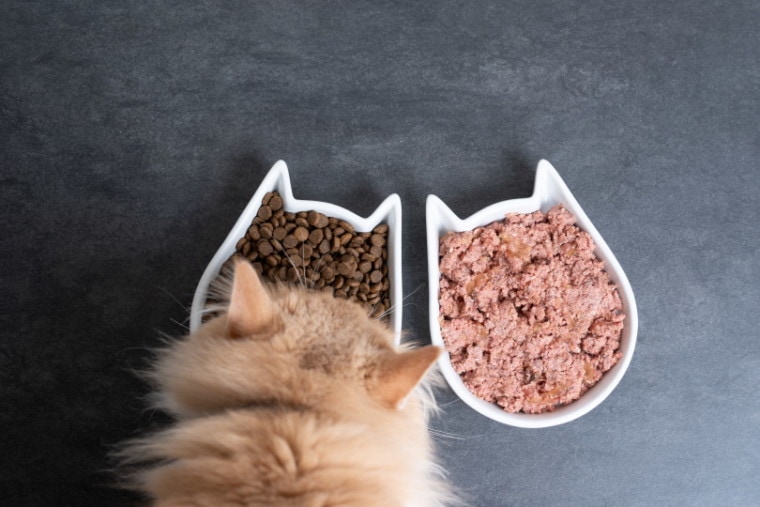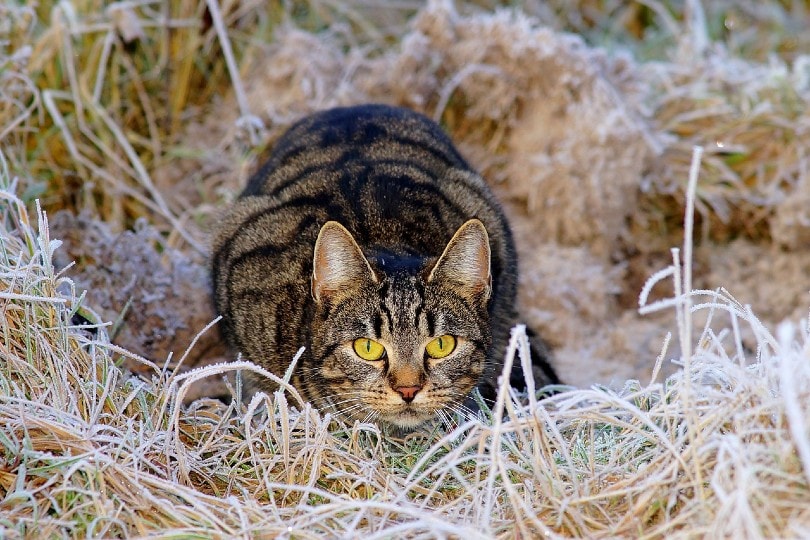
Even though there’s been a big trend toward feeding a vegan diet to pets, all cats are obligate carnivores, which means they require nutrients which are only found in other animals (in their flesh, fat, and other body parts). If cats do not get enough animal meat in their diet, due to their biology, they can get sick.
If you are interested in learning what it means to be an obligate carnivore, read on. We explain why cats are obligate carnivores and what this means for you as a cat owner.
Are All Cats Carnivores?
All cats are carnivores—specifically, obligate carnivores. What this means is that all cats, whether wild or domesticated, absolutely require meat for their biological health and well-being and cannot be transitioned to a plant-only diet.
What Is an Obligate Carnivore?
An obligate carnivore is an animal that requires nutrients only found in animals. The reason for this is that obligate carnivores cannot digest plants properly or get enough nutrients from them. As a result, obligate carnivores need to consume other animals to survive.
This distinguishes obligate carnivores from facultative carnivores (such as dogs), which are animals that have the ability to derive nutrition from non-animal sources as well. However, facultative carnivores usually only resort to eating vegetation in times when animal food is scarce and seem to prefer hunting whenever the opportunity arises. This sets them apart from omnivores; however, the distinction isn’t clearly defined in terms of the ratio of plant and animal foods consumed by such species.

Can Cats Be Vegan?
Since cats are obligate carnivores, they cannot be vegan. Even house cats that do a bad job at hunting require meat to survive. It is for this reason that you should never feed your cat a vegan or even vegetarian diet. They need meat to survive.
Biological Features of Your Cat That Make Them an Obligate Carnivore
Cats are considered obligate carnivores because there are certain nutrients they require which can only be found in other animals. Chief among these are the following:
These are not the only ingredients cats require from animals but are examples of some of the nutrients they can only derive from animals and not a plant-based diet.
In addition, cats, like many other mammalian predators, have a relatively short digestive tract, which renders them unable to properly digest the tough cellulose found in plants. They also lack many of the enzymes that herbivores and omnivores possess for the digestion of plant-based matter.
Like all other mammalian predators, cats have forward facing eyes, with a very widely overlapping visual field between the two eyes. This gives them binocular vision, which helps them with depth perception and makes hunting possible for them as a species. This further reinforces their role as carnivores within ecosystems.

The nutritional requirements of cats mandates that nearly all of your cat’s calories need to come from meat-based protein and some fat.
It is important to note that there is a misconception which states that cats don’t require carbohydrates. In reality, anything your cat eats will eventually be broken down into glucose, the simplest of all carbohydrates, before it is utilized by their bodies.
However, cats can derive carbohydrates from non-carbohydrate foods effectively through several methods. Cats are very efficient at de-novo synthesis of glucose from proteins, or the formation of glucose from the protein they consume. Furthermore, the fats that they consume contain glycerides, which is also broken down into glucose.
Therefore, to say cats do not require carbohydrates in their diet is incorrect. However, it doesn’t mean they need to eat starchy foods to obtain these carbohydrates.
Can I Feed My Cat Meat Instead of Cat Food?
Though commercial cat foods remain the most popular and convenient way of feeding pet cats, many owners are drawn towards the allure of meat-based diets. These include fresh cooked diets and raw, meat-based diets.
Potential Benefits of a Fresh or Raw Diet For Cats
Most of the benefits of a raw or fresh diet are considered anecdotal. In other words, many of these are benefits that many owners have claimed to see in their cats, however, they haven’t been definitely proven in experimental circumstances. Therefore, it is incorrect to assume that switching your cat to a raw or fresh diet will offer them these benefits. Nonetheless, some aspects of a raw or fresh diet have been tested on an experimental basis.
The benefits (both anecdotal and those that have been researched) include the following:

Potential Risk of a Fresh or Raw Diet for Cats
The potential risks of a fresh or raw diet for cats has been better studied than the potential benefits of such a diet. This is because of the implications that such a diet might have for humans that are in close proximity to their pets all the time.
If your cat is registered as an emotional support animal, or is in close proximity with children, the elderly, or those with compromised immune systems, it might be against the law to feed them raw foods or diets. Consult your veterinarian about the laws in your area if you’re not sure about the legislation in your area.
Please note that if you have a service dog, they cannot be fed a raw diet and, therefore, should be fed separately from your cat (if your cat is on such a diet).
The potential risks of a raw or fresh diet include the following:
What Should I Feed My Cat?
Ultimately, what you feed your cat will come down to your preference, your budget, and a myriad of other factors involving your cat, such as their breed, age, nutritional status, pregnancy status, and many more. It is therefore best to consult your veterinarian about a diet that best suits you and your cat.
As long as you’re feeding your cat something that is appropriate for their needs as an obligate carnivore, there isn’t a right or wrong answer when it comes to your cat’s diet or their treats.
Final Thoughts
Cats are obligate carnivores, which means they require nutrients only found in animal flesh and organs.
The biological status of being an obligate carnivore has given rise to the popularity of fresh and raw diets for cats. These diets do show potential but aren’t entirely without their risks either.
Ultimately, the decision to modify your cat’s diet is one you should discuss with your veterinarian, as your cat will have varying needs depending on several factors. Therefore, this is a decision that’s best discussed with a professional.
Related Reads:
Featured Image Credit: DarkBird, Shutterstock







